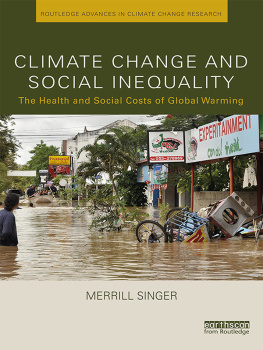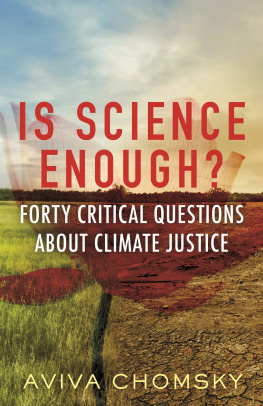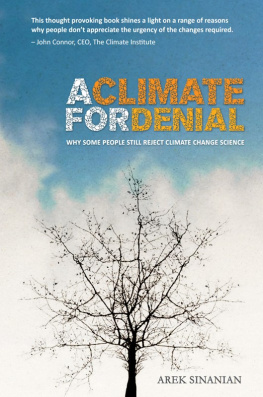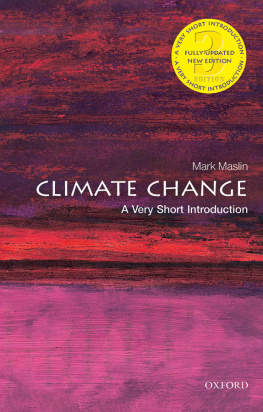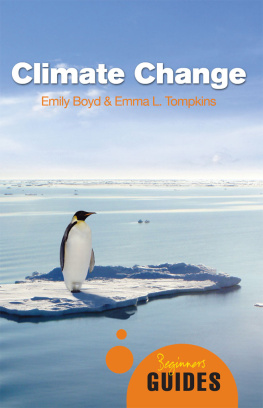
Rapid Climate Change
Scott G. McNall
The book reviews the science of climate change and explains why it is one of the most difficult problems humanity has ever tackled. Climate change is a wicked problem bound up with problems of population growth, environmental degradation, and world problems of growing social and economic inequality. The book explores the politicization of the topic, the polarization of opinion, and the reasons why, for some, science has become just another ideology to be contested. How do humans assess risk? Why are they so bad at focusing on the future? How can we solve the problem of climate change? These are the questions this work answers.
Scott G. McNall is the Senior Advisor to the President for Sustainability at California State University, Chico. He was the founding Executive Director of the Institute for Sustainable Development at the university and served for three years in that capacity. He is Professor Emeritus of Sociology and has served as Provost for 13 years and Interim University President for almost one year.
Framing 21st Century Social Issues
The goal of this new, unique Series is to offer readable, teachable thinking frames on todays social problems and social issues by leading scholars. These are available for view on http://routledge.customgateway.com/routledge-social-issues.html.
For instructors teaching a wide range of courses in the social sciences, the Routledge Social Issues Collection now offers the best of both worlds: originally written short texts that provide overviews to important social issues as well as teachable excerpts from larger works previously published by Routledge and other presses.
As an instructor, click to the website to view the library and decide how to build your custom anthology and which thinking frames to assign. Students can choose to receive the assigned materials in print and/or electronic formats at an affordable price.
Body Problems
Running and Living Long in a Fast-Food Society
Ben Agger
Sex, Drugs, and Death
Addressing Youth Problems in American Society
Tammy Anderson
The Stupidity Epidemic
Worrying About Students, Schools, and Americas Future
Joel Best
Empire Versus Democracy
The Triumph of Corporate and Military Power
Carl Boggs
Contentious Identities
Ethnic, Religious, and Nationalist Conflicts in Todays World
Daniel Chirot
The Future of Higher Education
Dan Clawson and Max Page
Waste and Consumption
Capitalism, the Environment, and the Life of Things
Simonetta Falasca-Zamponi
Rapid Climate Change
Causes, Consequences, and Solutions
Scott G. McNall
The Problem of Emotions in Societies
Jonathan H. Turner
Outsourcing the Womb
Race, Class, and Gestational Surrogacy in a Global Market
France Winddance Twine
Changing Times for Black Professionals
Adia Harvey Wingfield
Why Nations Go to War
A Sociology of Military Conflict
Mark Worrell
Rapid Climate Change
Causes, Consequences, and Solutions
Scott G. McNall
California State University, Chico
First published 2011
by Routledge
270 Madison Avenue, New York, NY 10016
Simultaneously published in the UK
by Routledge
2 Park Square, Milton Park, Abingdon, Oxon OX14 4RN
Routledge is an imprint of the Taylor & Francis Group, an informa business
2011 Taylor & Francis
The right of Scott G. McNall to be identifi ed as author of this work has been asserted by him in accordance with sections 77 and 78 of the Copyright, Designs and Patents Act 1988.
Typeset in Garamond and Gill Sans by EvS Communication Networx, Inc.
All rights reserved. No part of this book may be reprinted or reproduced or utilized in any form or by any electronic, mechanical, or other means, now known or hereafter invented, including photocopying and recording, or in any information storage or retrieval system, without permission in writing from the publishers.
Trademark Notice: Product or corporate names may be trademarks or registered trademarks, and are used only for identification and explanation without intent to infringe.
Library of Congress Cataloging in Publication Data
McNall, Scott G.
Rapid climate change : causes, consequences, and solutions / Scott G. McNall. 1st ed.
p. cm. (Framing 21st century social issues)
1. Social ecology. 2. Global environmental change. 3. Environmental policy. 4. Climatic changesForecasting. I. Title.
HM861.M36 2011
363.73874dc22
2010040161
ISBN13: 978-0-415-89203-2 (pbk)
ISBN13: 978-0-203-83424-4 (ebk)
Series Foreword
The world in the early 21st century is beset with problemsa troubled economy, global warming, oil spills, religious and national conflict, poverty, HIV, health problems associated with sedentary lifestyles. Virtually no nation is exempt, and everyone, even in affluent countries, feels the impact of these global issues.
Since its inception in the 19th century, sociology has been the academic discipline dedicated to analyzing social problems. It is still so today. Sociologists offer not only diagnoses; they glimpse solutions, which they then offer to policy makers and citizens who work for a better world. Sociology played a major role in the civil rights movement during the 1960s in helping us to understand racial inequalities and prejudice, and it can play a major role today as we grapple with old and new issues.
This series builds on the giants of sociology, such as Weber, Durkheim, Marx, Parsons, Mills. It uses their frames, and newer ones, to focus on particular issues of contemporary concern. These books are about the nuts and bolts of social problems, but they are equally about the frames through which we analyze these problems. It is clear by now that there is no single correct way to view the world, but only paradigms, models, which function as lenses through which we peer. For example, in analyzing oil spills and environmental pollution, we can use a frame that views such outcomes as unfortunate results of a reasonable effort to harvest fossil fuels. Drill, baby, drill sometimes involves certain costs as pipelines rupture and oil spews forth. Or we could analyze these environmental crises as inevitable outcomes of our effort to dominate nature in the interest of profit. The first frame would solve oil spills with better environmental protection measures and clean-ups, while the second frame would attempt to prevent them altogether, perhaps shifting away from the use of petroleum and natural gas and toward alternative energies that are green.
These books introduce various frames such as these for viewing social problems. They also highlight debates between social scientists who frame problems differently. The books suggest solutions, both on the macro and micro levels. That is, they suggest what new policies might entail, and they also identify ways in which people, from the ground level, can work toward a better world, changing themselves and their lives and families and providing models of change for others.


